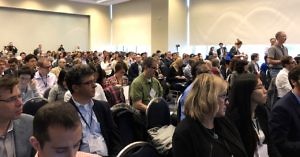How the microbiota impact response to cancer immunotherapy
We’ve been eagerly following the story of the microbiome and how it affects the response of people undergoing an allogeneic transplant or cancer immunotherapy since Marcel van den Brink’s original presentation at SITC in 2014, followed by Tom Gajewski the following year.
Since then, it has been fascinating to watch how the commensal microbiota has evolved into a niche unto itself. It’s one thing to report differences academically, but clinically we want to know if the information gleaned can help impact patient care. van den Brink’s group demonstrated that both GvHD and antibiotics could influence outcomes in their patients undergoing a stem cell transplant for hematologic malignancies and limiting use of ‘bad antiobiotics’ could change the course of outcomes.

A packed Microbiome session at SITC 2018
The Chicago angle was quite different. They noticed differences in the microbiota of their lab mice could impact the responses of their experiments with immunotherapy. Could that also impact patients? The answer was yes and off they went on a journey probably none of them anticipated to look at responders and non-responders in their melanoma cohort.
That then begs the question of whether the microbiota can be influenced and the outcome changed?
Several other groups of relevance in this space are the Laurence Zitvogel and Guido Kroemer labs in Paris, as well as Jennifer Wargo’s lab at MD Anderson in Houston.
We continue following the microbiome story to learn where we are and where we are going…
To learn more from our latest assessment and get a heads up on our oncology insights, subscribers can log-in or you can click to gain access to BSB Premium Content.
This content is restricted to subscribers